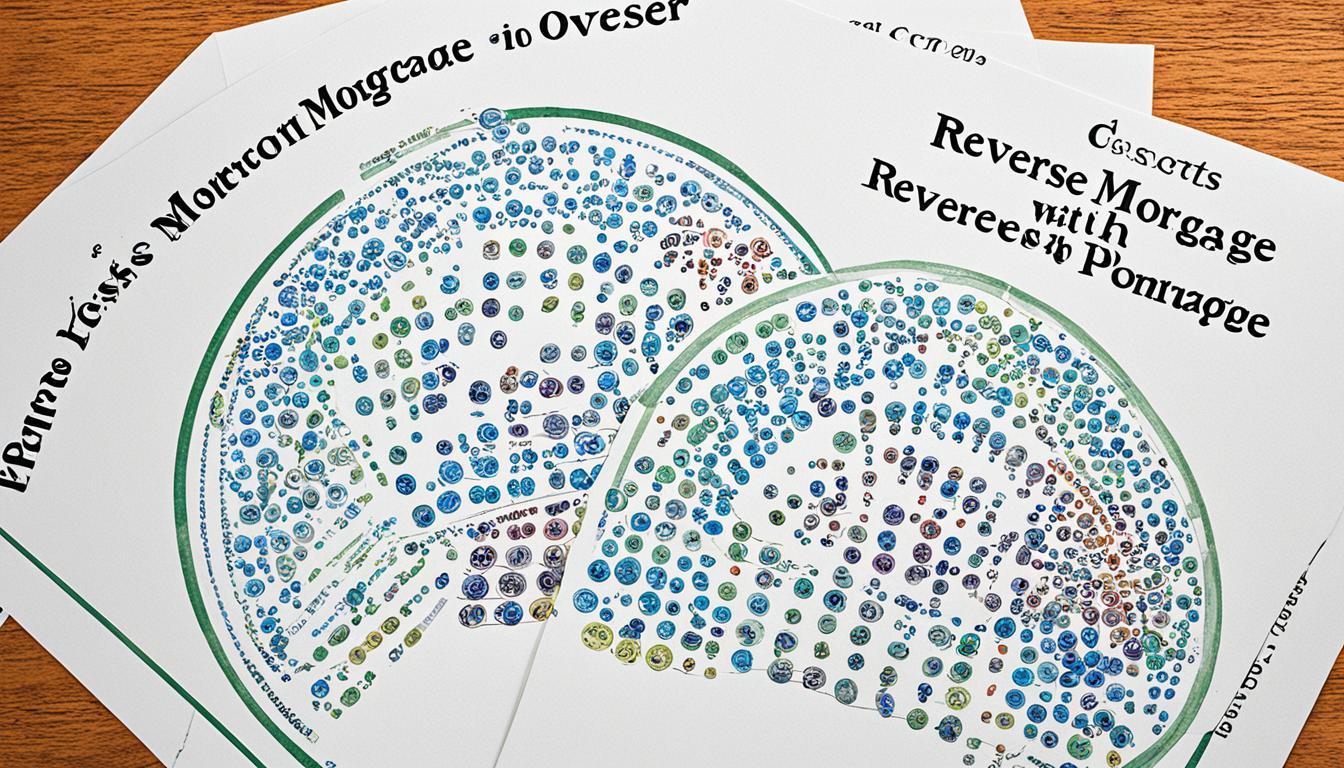Reverse Mortgage Calculator for Estimating Your Eligibility and Potential Benefits
A reverse mortgage calculator helps you figure out what you may qualify for and the benefits. You just need to enter your age, how much your home is worth, and the balance left on your mortgage. It then shows how much you could borrow and your potential gains from a reverse mortgage.
It looks at things like interest and how much of your home you own. This tool guides you to smarter financial choices and aids in retirement planning.
Key Takeaways:
- A reverse mortgage calculator can estimate your eligibility and potential benefits.
- The calculator considers factors like age, home value, and current mortgage balance.
- Using a reverse mortgage calculator can help you plan for a comfortable retirement.
- Compounding interest and home equity are factored into the calculations.
- Make informed decisions about your financial options with the help of a reverse mortgage calculator.
What is a Reverse Mortgage?
A reverse mortgage is a loan for homeowners aged 62 and older. It lets them turn part of their home equity into cash. This is unlike a regular mortgage because you don’t need to make monthly payments. The loan gets paid back when the homeowner sells their house, moves out, or passes away.
The Home Equity Conversion Mortgage (HECM) is the most common type. It is backed by the Federal Housing Administration (FHA). Before choosing a reverse mortgage, it is wise to know both its benefits and downsides. This way, you can make an informed choice.

These loans are designed for those seniors who are at least 62 and have enough equity. The HECM offers flexibility and borrower protection. It ensures you can still live in your home while receiving cash from your equity. Understanding these key points is crucial before you decide.
“A reverse mortgage allows older homeowners to tap into their home equity without selling their property.” – Financial Advisor, Jane Smith
One good thing about a reverse mortgage is that it can provide extra money for retired homeowners. They can get this money as regular paychecks or as a lump sum. It helps pay for things or improve retirement life. A big plus is that you or your family won’t owe more than the home’s value, even if the loan surpasses this.
Still, there are things to watch out for. A reverse mortgage can have high start-up costs and then keep costing you. This includes closing fees, insurance, and property taxes. If you don’t keep up with these, the loan might be due. It’s crucial to think over your financial position. Always talk to an expert before going with a reverse mortgage.
- Pros of reverse mortgages:
- Access to home equity without selling the property
- Provides income for retirees with substantial home equity
- Non-recourse loan, limiting liability for borrowers or their heirs
- Cons of reverse mortgages:
- High upfront costs and ongoing expenses
- Obligations to pay property taxes, insurance, and maintain the property
- Loan becomes due and payable if obligations are not met
How to Use a Reverse Mortgage Calculator
A reverse mortgage calculator helps you figure out important money details for your loan. Just put in info like your age, your home’s value, and how much is left on your mortgage. The calculator then shows you key numbers to help with your decisions.
First, you need to know your age, your home’s value, and your current mortgage balance. Then, fill these details into the calculator.
Note: The calculator gives estimates. It’s not an official loan offer. The numbers it shows are based on what you enter, and they might be different from the actual loan terms.
After adding your info, the calculator tells you how much you might get for a loan. This helps you see if you’re eligible and get an idea of how it might pay out. Remember, the actual loan could be different because of market conditions and fees.

Estimating Loan Eligibility and Potential Payout
The calculator uses your age, home value, and mortgage balance to work out the loan. It considers things like interest and your home equity for a detailed estimate.
Assessing Financial Options for Retirement
By using the calculator, you can look at different financial choices for your retirement. It gives you an idea of what you might receive. This could help you decide if a reverse mortgage is right for you.
Remember, the calculator’s numbers are not final. Talk to a financial advisor or a reverse mortgage expert. They can offer advice that’s tailored to your finances.
- Step 1: Put in your age, home value, and mortgage balance.
- Step 2: Look at the estimated loan and payout amounts.
- Step 3: Think about fees, market changes, and what you want financially.
- Step 4: Speak with a financial expert to explore your reverse mortgage options.
To sum up, the reverse mortgage calculator is great for seeing if it fits your financial and retirement plans. Use it to get a sense of what a reverse mortgage could do for you.
Understanding the Costs and Considerations
Thinking about a reverse mortgage? It’s key to know the costs. There are many fees and expenses you should understand before you decide.
Reverse Mortgage Closing Costs
Closing costs are an important fee at the start of a reverse mortgage. They cover things like the lender’s processing fees and all needed paperwork. This includes title searches and appraisals too.

Ongoing Expenses
After the closing costs, remember there are regular costs to think about. These include fees for servicing, charges for your property, and an MIP paid yearly.
- Servicing fees help with managing your account and issuing statements.
- Property charges cover taxes and homeowner’s insurance. They’re a crucial ongoing expense.
- An MIP is an insurance to protect lenders. It’s paid to the FHA each year.
Loan Repayment and Property Charges
You’ll need to repay the loan if you sell the home, move, or pass away. This includes any interest and fees. Not paying your property charges can lead to foreclosure too.
Thinking about all these costs is crucial. Before making a decision, talking to a financial advisor is wise. They can give advice tailored to your situation. They ensure you understand all the financial impacts clearly.
Conclusion
A reverse mortgage can help seniors tap into home equity for a better retirement. It lets homeowners 62 and older turn part of their equity into cash without needing to pay monthly. This option gives them the financial room to handle living and medical expenses.
But, deciding on a reverse mortgage should not be rushed. It brings benefits but also needs careful thought. Aspects like closing costs and effects on what you leave behind should be weighed. It’s smart to talk to advisors or specialists too, to make sure it fits your financial plans.
Using a reverse mortgage calculator is a great first step. It estimates what you could get from a loan, helping you think things through. With this info, you can plan a solid retirement that uses your home equity wisely.




